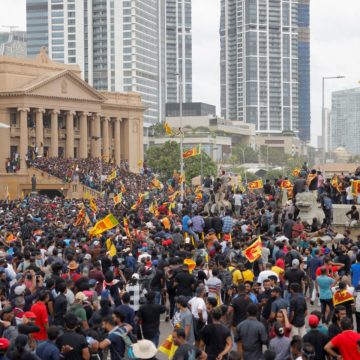 Devaka Gunawardena , Niyanthini Kadirgamar, and Ahilan Kadirgamar in Phenomenal World:
Devaka Gunawardena , Niyanthini Kadirgamar, and Ahilan Kadirgamar in Phenomenal World:
Massive demonstrations that swept Sri Lanka last year exposed the serious challenges at the heart of the global economy. In July 2022, former President Gotabaya Rajapaksa was forced to flee the country, only a few months after announcing a hasty default of Sri Lanka’s foreign debt obligations. He faced a wall of opposition as the nation suffered infamous kilometers-long fuel queues, power outages, and food and medicinal shortages, crippling everyday life.
In the months since, the current government led by Ranil Wickremesinghe—allied with the party of the disgraced Rajapaksa family—has appeared savvier than its predecessor, implementing a quota system to manage fuel distribution and end the queues. However, the government has also tripled fuel prices, which has severely dampened demand. Fuel consumption is half of what it was a year ago, bringing economic activity to a grinding halt. Inflation has skyrocketed, with food inflation peaking at 94 percent in September 2022. A quarter of Sri Lankans are facing severe food insecurity; household incomes across the board have decreased. The Central Bank dramatically doubled interest rates, making access to credit for economic activity extraordinarily difficult. Rural livelihoods have been disrupted. Many small businesses are collapsing.
More here.
